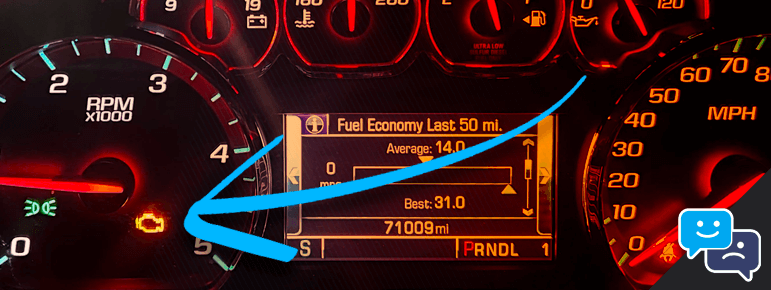Encountering a Chevrolet check engine light can be both alarming and confusing. With this pesky indicator known to signal anything from a loose gas cap to an overheating engine. So, what are the common causes for a check engine light on your Chevrolet?
A check engine light in Chevrolet vehicles often indicates a loose or missing gas cap. However, it can also signal issues with the oxygen sensor, catalytic converter, air flow sensor, ignition coil, or spark plugs.
Understanding the cause of the check engine light is crucial for maintaining your vehicle’s health. In this comprehensive guide, we will provide insights into the most common triggers for Chevrolet’s check engine light.
Let’s unravel the mystery behind that glowing warning on your dashboard!
Common Causes for Chevrolet Check Engine Light
Right off the bat, the most common reason for that Chevrolet check engine light is due to a loose gas cap. Chevrolet recommends tightening the fuel cap until it clicks three times.
Other common causes for a Chevrolet check engine light include a faulty oxygen sensor, faulty catalytic converter, faulty ignition coil, and bad spark plugs.
Loose gas cap
A loose gas cap is a common cause for the Chevrolet check engine light to come on. It may seem small, but it can lead to big problems. Problems such as exposure to dirt and grime, and fuel to vanish in the air.
This means you have less gas for your car’s engine and lose miles per gallon. Also, it isn’t ideal for the environment either.
The car’s computer sees this as a flaw in the fuel system and lights up your dashboard with the check engine warning.
To fix this problem, turn off your car and tighten your gas cap. Drive around for about 30 miles. Often, this makes the light go away after some minutes of driving. But if it does not stop shining, there might be other issues causing it to blink.
Faulty Oxygen Sensor
Simply put, a bad oxygen sensor makes the engine get too much or not enough fuel. This can harm the engine if the fuel is too little. Because the oxygen sensor is in the exhaust stream, it can easily become contaminated due to an excessively rich fuel mixture or engine oil blow-by.
The faulty oxygen sensor also changes how much gas your car uses. It might even hurt parts like the catalytic converter and spark plugs. Your check engine light will illuminate if the car detects a bad oxygen sensor.
Signs of a Failing Oxygen Sensor:
- Noticeable Loss of Fuel Efficiency
- Sulfur or ‘Rotten Egg’ smell from Exhaust
- Black smoke from exhaust
- Emission levels reach high levels
- Your engine hesitates, skips, begins bucking or has power surges
It’s important to note that, black smoke from the exhaust can also be a result of oil consumption.
Faulty catalytic converter
A bad catalytic converter is a big deal, and will turn on your Chevrolet check engine light. This part takes harmful gas from the car and makes it less toxic.
And if that is not bad enough, your car will use more gas if the catalytic converter isn’t working right. You may even see that driving is hard or hear odd sounds.
You want to keep this part working well to avoid other problems in your car. A bad spark plug or sensor can also hurt the catalytic converter.
Signs of a Failing Catalytic Converter:
- Slow powertrain performance
- Reduced acceleration
- Smell of rotten eggs or sulfur from the exhaust
- Dark exhaust smoke
- Extreme heat from under the vehicle
If you find these problems, get it checked out. It’s possible all that catalytic converter needs is a good cleaning.
Faulty ignition coil
A faulty ignition coil in your Chevrolet can cause problems like a loss of power or slow acceleration. Ignition coils can get too hot and cause engine misfires, which can damage other parts of the engine.
When an ignition coil is weak or failing, you may notice that your engine doesn’t run smoothly when idling, and it can be hard to start your vehicle. If you ignore a faulty ignition coil, it could lead to more expensive repairs like clogged catalytic converters or damage to other engine components.
So if you see the check engine light on because of a faulty ignition coil, it’s important to address the issue as soon as possible.
In order to fix a faulty ignition coil in your Chevrolet vehicle, it’s best to seek professional help from qualified technicians who specialize in working with Chevrolets. They will have the necessary knowledge and tools to diagnose and replace the faulty ignition coil efficiently and effectively.
Bad Spark Plugs
Bad spark plugs can cause the Chevrolet check engine light to turn on. In fact, they are a common culprit for engine problems. When spark plugs are not working properly, the engine may misfire, causing the check engine light to illuminate.
A rough running engine is also a sign of bad spark plugs. In fact, if your fuel efficiency decreases or if your engine hesitates or stumbles during acceleration, it could be due to faulty spark plugs.
To fix this issue, you should replace your bad spark plugs with new ones as soon as possible. This will help improve engine performance and prevent further damage.
Truth is, it’s always a good idea to have regular maintenance and inspections done on your Chevrolet vehicle to catch any issues with spark plugs early on.
What to Do if Your Chevrolet Check Engine Light Comes On
If your Chevrolet check engine light comes on, there are a few steps you can take to address the issue.
Check Your Gas Cap
If you see the check engine light on your Chevrolet, one simple thing to do is check your gas cap. A loose or missing gas cap can actually cause the check engine light to come on.
So, if you recently put gas in your Chevrolet and the check engine light comes on right after that, it’s a good idea to make sure your gas cap isn’t loose. To address this issue, first open the fuel cap compartment. Examine the fuel cap to ensure it’s positioned correctly. If everything seems in order, unscrew it and then securely reattach it. It might not have been tightened properly.
However, if you find that your gas cap is cracked or damaged in any way, it’s best to replace it with a new one.
Reset the Check Engine Light
To reset the check engine light on your Chevrolet, there are a few methods you can try. One way is to start the car and let it run for one second, then turn it off. Repeat this process two more times.
And if all else fails, disconnecting the negative battery cable is an easy way to reset it. Just remember that if there was nothing noticeably wrong with your engine or if you’ve already fixed any issues, disconnecting the negative battery cable should do the trick in resetting that pesky check engine light.
Schedule a Service Appointment
To address the check engine light in your Chevrolet, it is recommended to schedule a service appointment. This will allow trained technicians to diagnose and fix the problem accurately.
Worth noting, Chevrolet offers remote diagnostics. This means they can help identify the issue before you even take your vehicle in for servicing. You can also schedule a service appointment online or by calling your local Chevrolet dealership directly.
Truth is, trying to fix the issue on your own could make things worse if you don’t know what you’re doing. So, don’t hesitate to reach out for professional assistance if needed.
Understanding Solid vs. Blinking Chevy Check Engine Light
It’s important to note that there are two states for the Chevrolet check engine light. When the light is solidly illuminated, it typically points to a non-urgent issue. Issues such as a loose gas cap.
Even if the car seems to be running fine, it’s essential to have the issue diagnosed as soon as possible to prevent potential long-term damage or worsening of the condition.
On the other hand, a blinking or flashing “Check Engine” light is a clear signal that there’s a severe and potentially harmful problem. This is especially concerning if the problem stems from a failing catalytic converter.
When this light blinks, it usually indicates that there’s a misfire in one or more of the engine’s cylinders, leading to unburnt fuel entering the catalytic converter. This unburnt fuel can cause the converter to overheat and suffer damage.
If you experience a flashing check engine light, you should reduce your speed, minimize driving, and seek professional assistance promptly. Driving with a blinking light for extended periods can lead to costly repairs.

Final Thoughts: Chevrolet Check Engine Light
If the check engine light in your Chevrolet comes on, don’t ignore it. It’s a sign that something is wrong with your vehicle and needs attention. Common causes include faulty sensors, loose gas caps, or issues with the catalytic converter.
Take your car to a mechanic for diagnosis and repair to prevent further damage. Don’t forget to address the issue promptly and keep up with regular maintenance to ensure your Chevy runs smoothly for many miles to come.

Managing Editor
Christopher is an automotive technical writer. When he’s not at the local autocross event, he can often be found working on one of his cars. Specializes in automotive class action law, industry trends, and automotive maintenance. Email me direct, or learn more about us

